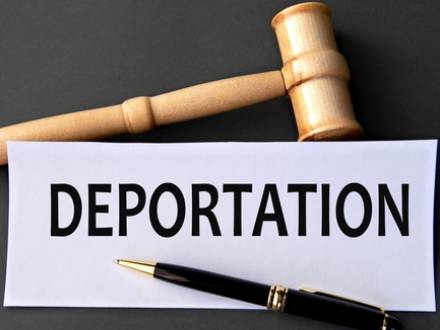 The administration of President Donald Trump is seeking to crack down on illegal immigrants. This was a key issue in the 2024 presidential campaign, and since assuming office for his second term in January 2025, President Trump has directed Immigration and Customs Enforcement (ICE) to detain and deport illegal or undocumented immigrants. However, the deportation process can be complex, and understanding the steps followed in these cases can sometimes be difficult.
The administration of President Donald Trump is seeking to crack down on illegal immigrants. This was a key issue in the 2024 presidential campaign, and since assuming office for his second term in January 2025, President Trump has directed Immigration and Customs Enforcement (ICE) to detain and deport illegal or undocumented immigrants. However, the deportation process can be complex, and understanding the steps followed in these cases can sometimes be difficult.
Many deportation cases are related to criminal charges against immigrants, and people who are arrested by local or state police could find that their immigration status is at risk. Because of the concerns faced by immigrants who become involved in the criminal justice system, it is important to work with an attorney who can help defend against criminal charges and provide guidance on the ways a criminal case may affect a person’s immigration status.
As immigration officials follow President Trump’s orders and seek to detain and deport illegal or undocumented immigrants, they may use the following procedures:
Identifying Deportable Immigrants: ICE agents and other officials working for the Department of Homeland Security may take steps to determine whether certain people should be removed from the United States. Immigrants may be subject to deportation if they entered the country without authorization or stayed in the U.S. after the expiration of a temporary visa, such as a student or tourist visa. Immigrants who have been convicted of certain crimes may also be eligible for deportation, even if they are lawful permanent residents with valid Green Cards.
Arrest and Detention: ICE agents may perform arrests of immigrants they believe are deportable. However, in many cases, immigrants may be arrested by law enforcement agencies that partner with the Department of Homeland Security under what are known as 287(g) Programs. In certain states, when a person is arrested on suspicion of a crime, police may notify ICE and make arrangements to transfer custody to federal officials who may pursue deportation.
Immigration Court: A deportation case will be reviewed by an immigration judge, but due to backlogs in the system, it may take years before a case can be heard. In some cases, immigrants may be released on bond while their cases are pending. A person may be able to defend against deportation by proving that they are not deportable, claiming asylum, or requesting cancellation of removal or withholding of removal. There are multiple options for appealing decisions made during this process. However, the Trump administration is pursuing expedited removal in some cases.
Removal: After a final removal order is issued, a person may still need to wait before they will be forced to leave the United States. Wait times may depend on whether a country is accepting people who are deported or whether third-party countries may agree to take deportees. A person may also voluntarily leave the U.S., which will allow them to avoid having a deportation on their record that could prevent them from attempting to return to the country at a later date.
In Connecticut, the Trust Act restricts law enforcement from cooperating with ICE. The Connecticut Department of Corrections can only notify ICE if an inmate has been charged with or convicted of a Class B or Class A felony. Connecticut lawmakers are currently considering legislation that would strengthen these protections, helping to ensure that immigrants are not treated unfairly by the federal government.
Because of the ways immigration law interacts with criminal law, immigrants who are arrested and charged with crimes will need to understand what steps they can take to protect against a potential deportation. At Woolf & Ross Law Firm, LLC, our Hartford criminal defense attorneys can provide representation for immigrants who are facing criminal charges, ensuring that they understand the ways their immigration status may be affected if they are convicted. We work to protect our clients’ rights and help them avoid issues that could potentially result in deportation. To discuss your case with us in a free consultation, contact us at 860-290-8690.
 50 Founders Plaza
50 Founders Plaza

